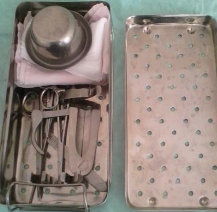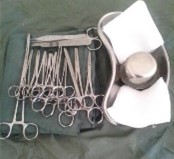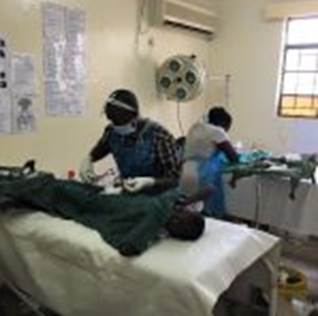Voluntary Medical Male Circumcision(VMMC)
NRHS Programmes
Voluntary Medical Male Circumcision

By the late 1990’s, many cross-sectional and longitudinal studies conducted across numerous countries strongly indicated that uncircumcised men were at significantly higher risk of acquiring HIV than circumcised men. Nevertheless, it became apparent that more conclusive studies (i.e., randomized controlled trials) would be necessary to persuade the international health community to endorse voluntary medical male circumcision (VMMC) as an HIV prevention strategy.
In 2001 three colleagues teamed up to bring Kenya (Prof Ndinya Achola), Canada (Prof Steve Moses) and the United states (Prof Robert Bailey) together to start what became the randomised controlled trial that demonstrated the effectiveness of VMMC for the prevention of HIV acquisition. This research study had them establish the Universities of Nairobi, Illinois and Manitoba (UNIM) Research Centre. At the end of the trial in late 2007 along with the results from two other trials conducted in Uganda and South Africa, the World Health Organisation (WHO) recommended that VMMC should be included in the arsenal of HIV prevention and that VMMC should be scaled up in thirteen countries where HIV rates were high and most men were not circumcised. This saw NRHS spearhead the initial rollout and sustainability of VMMC services throughout Kenya with focus on the greater Nyanza, Turkana, Nairobi and West Pokot regions. In addition to adult VMMC, NRHS also spearheaded the rollout of Early Infant Male Circumcision (EIMC) which targeted infants in the first 60 days of life, and we have been active in developing not only the Kenyan guidelines for VMMC, but also the WHO policy and practice guidelines as well as assisting the Ministries of Health and implementing partners in many sub-Saharan African countries on how best to perform safe VMMC and scale up their national programmes.
In addition to adult VMMC, NRHS also spearheaded the rollout of Early Infant Male Circumcision (EIMC) which targeted infants in the first 60 days of life, and we have been active in developing not only the Kenyan guidelines for VMMC, but also the WHO policy and practice guidelines as well as assisting the Ministries of Health and implementing partners in many sub-Saharan African countries on how best to perform safe VMMC and scale up their national programmes.
Over the years we have developed the reputation of being ‘the premier’ VMMC provider and trainer in the region with tens of thousands of clients being circumcised by NRHS and thousands of healthcare workers being trained by NRHS as well as tens of research studies on VMMC being conducted by NRHS and collaborators. VMMC services were offered as a minimum package as per the national VMMC guidelines. HIV Testing Services (HTS) were offered as an integral component of services offered under the VMMC minimum package. Clients seeking VMMC services were also screened for Sexually Transmitted Infections (STIs) and syndromic treatment administered as per the Kenyan guidelines for STI treatment, in addition to condom provision as part of the minimum package of VMMC services.

Continuing on its footsteps as a one of the foremost providers of comprehensive VMMC services since the onset of the national scale-up of VMMC that started in 2008, provision of the VMMC and EIMC services by NRHS are still continuing at our UNIM Center of VMMC Excellence. This has mostly been due to its reputation in the community as the premier VMMC provider, with many men coming as “walk-ins” for VMMC services, and many parents bringing their young adolescent sons for the services, especially around the time of school holidays.  Remarkably, many of the parents who bring their babies to NRHS for EIMC are those who had a previous son circumcised here, or the father of the baby circumcised by NRHS and many adults coming for VMMC are referred by someone who was circumcised at NRHS.
Remarkably, many of the parents who bring their babies to NRHS for EIMC are those who had a previous son circumcised here, or the father of the baby circumcised by NRHS and many adults coming for VMMC are referred by someone who was circumcised at NRHS.
